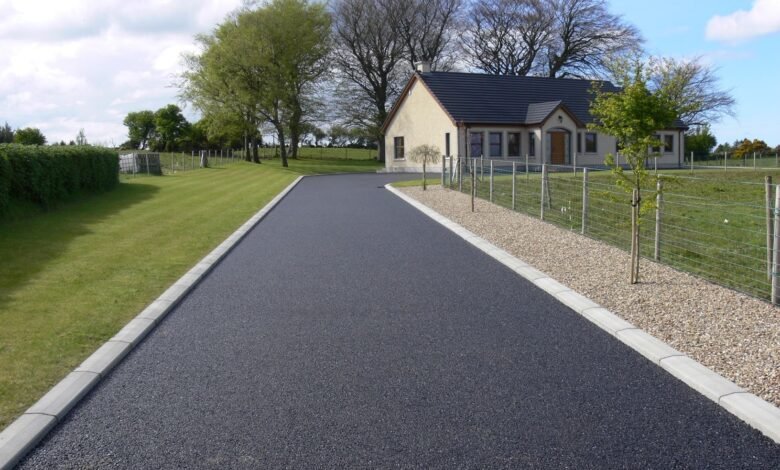
When investing in a driveway, homeowners want a surface that will withstand the elements year-round. Tarmac driveways are well-regarded for their ability to handle everything from scorching summers to freezing winters. Their durability, flexibility, and weather-resistant properties make them an excellent choice for anyone looking for a reliable outdoor surface.
If you’re considering upgrading, tarmac driveways in Bournemouth offer a smart solution that combines performance with sleek aesthetics. In this article, we’ll explore how tarmac driveways stand up to extreme weather conditions and why they remain a popular choice for all climates.
1. Resilience to Freezing Temperatures
Winter weather can wreak havoc on many driveway materials, but tarmac holds up well in freezing conditions. Its flexibility allows it to contract and expand without cracking, a common issue with more rigid materials like concrete. Proper drainage further prevents water from seeping into the surface, minimising the risk of frost damage.
2. Heat Resistance in Summer Months
In regions with high temperatures, some driveway surfaces soften or become sticky. Tarmac is designed to withstand the heat, though extreme conditions can make it slightly pliable. Choosing high-quality tarmac and applying a protective sealant helps the surface maintain its integrity even on the hottest days, preventing dents and soft spots.
3. Excellent Water Drainage Capabilities
Heavy rainfall is no match for tarmac driveways, thanks to their smooth surface and efficient drainage properties. Tarmac can be laid with a slight slope to guide water away from the surface, preventing puddles and erosion. In areas prone to flooding, porous tarmac options allow water to seep through the surface, reducing runoff and helping the environment.
4. Resistance to Frost Heave
Frost heave occurs when water trapped beneath the surface freezes and expands, causing the driveway to lift or crack. Tarmac’s flexibility reduces the risk of frost heave by adapting to temperature changes without breaking. Regular maintenance, such as sealing small cracks, can further protect the driveway from damage during freezing weather.
5. Withstands Heavy Snowfall and Ice
Tarmac’s dark colour absorbs heat from the sun, which can help snow and ice melt faster than on lighter surfaces. This makes it easier to manage snowy conditions without relying heavily on chemical de-icers. Using plastic shovels or snow blowers instead of metal tools will prevent scratches while clearing snow from the driveway.
6. Minimises the Impact of UV Exposure
Prolonged exposure to UV rays can cause surfaces to fade or weaken over time. Tarmac driveways are resistant to UV damage, but applying a sealant every few years will maintain their colour and strength. Sealants also protect against minor cracks caused by sun exposure, keeping the driveway looking fresh and new.
7. Adaptable to Sudden Temperature Changes
In climates where temperatures fluctuate rapidly, some materials struggle to cope with the expansion and contraction caused by these changes. Tarmac is uniquely suited to handle sudden temperature shifts thanks to its flexibility. This makes it less prone to cracking or splitting, even in areas with unpredictable weather.
8. Low Maintenance in All Seasons
One of tarmac’s biggest advantages is how easy it is to maintain, no matter the season. Regular cleaning with a hose or pressure washer is usually enough to keep it in top condition. Filling small cracks and applying a sealant periodically ensures the driveway remains weather-resistant year after year.
9. Handles Heavy Loads with Ease
In addition to weather resilience, tarmac driveways can support heavy vehicles without cracking under pressure. Whether dealing with large snowploughs in winter or heavy family vehicles in summer, the surface holds up without shifting or breaking. This durability makes tarmac ideal for driveways that see frequent use throughout the year.
10. Eco-Friendly and Sustainable Option
Tarmac’s ability to be recycled makes it an eco-friendly choice. When a tarmac surface reaches the end of its life, it can be removed, processed, and reused for new installations. Choosing tarmac means fewer resources are wasted, and its longevity reduces the need for frequent replacements.
Conclusion
Tarmac driveways are designed to handle whatever the weather throws at them. From extreme heat to freezing winters, tarmac’s flexibility, durability, and water resistance make it a reliable choice for homeowners in all climates. With proper installation and occasional maintenance, tarmac driveways can last for decades, providing a smooth and functional surface year-round.
If you want a driveway that’s tough enough to withstand the elements and still look great, consider installing a tarmac surface. Reach out to a professional installer today and enjoy the benefits of a weather-resistant driveway that enhances your property’s curb appeal.



